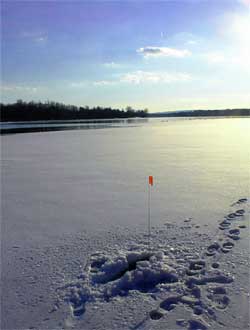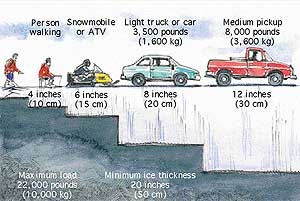Ice Fishing Safety And A Tip or Two
Ice Fishing Safety And A Tip or Two
By Bob Koeshall – The RiverRat
 Probably the most important thing about ice fishing is ice safety and coming back alive. There is an old saying that claims the ice testers are found in the spring. Through the years I have heard that the smart ice fisherman goes out on the ice after he has seen many others go out on the ice ahead of him. This theory does not always work so, always tell someone where you’re going to be, and never go on the ice alone. Bring a cell phone with you and a whistle. If you have a problem and need help you’ll be able to alert someone. Wear a Life Jacket either under or over your clothes. You should always bring an ice chisel with you to check on the ice in front of you before you step there. Ice thickness will never be consistent on any body of water, especially if the water is moving from a current source. Heavy snow cover insulates ice and prevents it from freezing as evenly and as quickly as it would if the snow weren’t there. Snow cover is also deceptive and makes evaluating the ice cover difficult. Be especially wary of river ice, as it can be highly variable in thickness due to the erosive action of the underlying river current. One can be standing on ice eight-inches thick on a river and just a few feet away, the ice may be only two-inches thick. Can you tell by looking at the picture to the left how thick the ice is where the tip-up is located? I would not recommend this area.
Probably the most important thing about ice fishing is ice safety and coming back alive. There is an old saying that claims the ice testers are found in the spring. Through the years I have heard that the smart ice fisherman goes out on the ice after he has seen many others go out on the ice ahead of him. This theory does not always work so, always tell someone where you’re going to be, and never go on the ice alone. Bring a cell phone with you and a whistle. If you have a problem and need help you’ll be able to alert someone. Wear a Life Jacket either under or over your clothes. You should always bring an ice chisel with you to check on the ice in front of you before you step there. Ice thickness will never be consistent on any body of water, especially if the water is moving from a current source. Heavy snow cover insulates ice and prevents it from freezing as evenly and as quickly as it would if the snow weren’t there. Snow cover is also deceptive and makes evaluating the ice cover difficult. Be especially wary of river ice, as it can be highly variable in thickness due to the erosive action of the underlying river current. One can be standing on ice eight-inches thick on a river and just a few feet away, the ice may be only two-inches thick. Can you tell by looking at the picture to the left how thick the ice is where the tip-up is located? I would not recommend this area. Drill test holes as you move out onto the lake to help judge the ice thickness. Stay away from cracks, seams, pressure cracks and ridges, as well as slushy spots, and dark areas that signify thin ice. Knowing how to judge ice conditions will help you determine where you’re going to fish. The ice fisherman who expects he might have some troubles prepares for them. Falling through the ice is not the most pleasant thing to do. In most cases the water isn’t deep, but it’s still mighty cold!! Let’s say you went through and you’re standing in water up to your waist and there’s no one around to give you a hand climbing out. Trying to get a grip on the flat surface of ice is next to impossible to haul yourself out. You can make a life saving device in a few minutes right out of things you already have in your garage. Take an old broom handle and cut off two pieces about six or eight inches long. On one end of each, drill a hole through the top so you can run a nylon cord through it. On the bottom end drill a pilot hole, fill it with glue then pound a nail that has the head cut off into it. Now run a nylon cord that is long enough to go through the sleeves of your jacket so the wooden handles dangle from each hand. Now if you break through the ice you simply jab the nails into the surface and pull yourself out. Now suppose you went through the ice in an area of deep water. The first thing to do is to remain calm, and slowly move back to where you fell through. Use your ice picks to pull yourself up onto the ice on your stomach then push yourself forward on your stomach to distribute your weight over a greater surface area. Do not stand up until you are on an area of solid ice, then get off the ice as quickly as possible. When two fellows are going out, they tie themselves together with a long rope perhaps as long as 30 ft. If one guy goes through the ice the other guy can pull him out. A lot of ice fishermen wear skis, or snowshoes when heading out. Skis or snowshoes distribute your weight over a larger surface and chances of you breaking through are not as great. There are those who will tell you if you hear a loud cracking, while you’re on the ice to not pay any attention to it. Don’t you believe it! Ice cracking is one of the scariest sounds you’ll ever hear. It means the ice is under stress and could break so pressure is relieved. It could break under you or a mile away and there is no way of knowing where it will break. Around here in Central Wisconsin, we have the Petenwell Flowage. It’s 23,040 acres. If you’re out on the lake a good distance from shore and you hear cracking my advice is to haul out of there NOW ! Ice fishing can be one way to help pass winter that is inexpensive and you can meet some very fine folks. If you’re new to the sport the old-timers on the ice will be more than willing to give you a few tips to make your outing a success. Dress warm and don’t take any chances on ice that you aren’t sure of. Here is an old tip to keep your hole free of skim ice and keep your hands warm as well. For those that like to rough it out in the open come hard water, here is an old trick I’d like to share with you. Take a one pound coffee can and drill a ¼ inch hole a ½ inch from the bottom of the can. Take 8 feet of ¼ inch copper tubing and stick about 8 inches out of the hole in the can and wrap the tubing around and around the inside of the can with the last foot or so sticking out the top, aiming down. Throw a couple of handfuls of self-starting charcoal in the can and light it. Set the can next to your hole, with the lower end of the tube in the water. The heat from the charcoal will suck up the water, heat it and spit it back into the water from the top tube, keeping your hole ice-free no matter how cold it gets and the charcoal will burn for hours. You can fashion a handle from a coat hanger or whatever works great for us jig fisherman. This table for hard clear ice is conservative, but still should be used only as a guideline. Ice thickness alone is not always an accurate measure of its strength. Also watch the weather and wind on partially frozen water bodies. I've ice fished on bays of Lake Superior where a foot of solid ice was present one day, only to be totally removed by wind during the night. Coming back to open water the next day was an eye-opener. Constantly assess ice and weather conditions each time you go fishing  Hypothermia It's been called the silent killer. Immersion in cold water and overexposure to cold, wet, and windy conditions can cause hypothermia, which is a serious cooling of the body core. Symptoms can include shivering, flushed skin even turning blue, slurred speech, mental confusion, poor co-ordination, and stiff muscles, which can lead to unconsciousness and heart failure. In addition, a potentially fatal condition called "after drop" can occur when cold blood from the extremities starts to circulate again. Seek medical attention for a hypothermia victim as soon as possible. If you have to deal with mild to moderate hypothermia, there are several steps. Reduce heat loss by getting dry clothing or additional dry clothing, seeking shelter (ice shack, car), or trying to increase physical activity. Add fuel and fluids, such as hot liquids, sugars, carbohydrates, and proteins (avoid alcohol, caffeine, and tobacco). Add heat from a fire or other external source, such as a sleeping bag or body-to-body contact with another person. If you have any questions on anything in this article you can e-mail me at either [email protected] or [email protected]. I’d like also to thank my friends at Crestliner Boats, Bombardier Motor Corp. Magic products, Lake-link.com, Fish-Wisconsin.com, Fishtheriver.com, Landbigfish.com, , CharlieBrewer tackle, Lowrance locators, St.Croix Rods, Heckels marine, Amherst Marine, Comprop Props, ISG Jigs, Reeds Sporting Goods, Big Fish Tackle Co., Ipsglass.com, Thermoilbatteries.com, Pepsi of Americas, Beckman nets, Trojan Batteries, Black-Widow Fishing Line, TICA Reels, Minn-Kota Trolling, motors, Austackle Lures, Exciter Baits, Today’s Tackle Co., Jere’s Bait and Tackle, Misty’s Menu, Tennesse Trailers, and others who have helped me along the way. This article MAY NOT be reproduced, or used in Any Way without my written permission. Bob is a Licensed Wisconsin Fishing Guide, and owner of Gone Fishing Guide Service. Specializing in Walleyes, on the Wisconsin River System. He is also an outdoors field reporter for many fishing web sites, Author, Historian on the Wis. River and the Petenwell Flowage in Central Wisconsin, and on many Pro-Staff programs for various tackle manufactures, Crestliner Boats, and Evinrude Outboards. He has written many articles on Walleye Fishing, and informational articles on the waters in Central Wisconsin. PLEASE CPR ALL FEMALES, THE FUTURE OF FISHING DEPENDS ON IT!!
|
